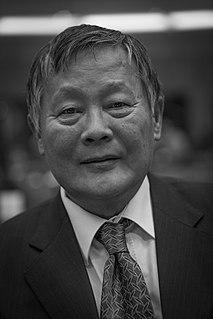A Quote by Wei Jingsheng
Democracy is not a mere consequence, a certain stage in the development of society. It is the condition on which the survival of productive forces depends.
Related Quotes
Changes in society are due chiefly to the development of the internal contradictions in society, that is, the contradiction between the productive forces and the relations of production, the contradiction between classes and the contradiction between the old and the new; it is the development of these contradictions that pushes society forward and gives the impetu6 for the suppression of the old society by the new.
A society which discards those who are weak and non-productive risks exaggerating the development of reason, organisation, aggression and the desire to dominate. It becomes a society without a heart, without kindness - a rational and sad society, lacking celebration, divided within itself and given to competition, rivalry and, finally, violence.
When we talk about Cuban democracy we are referring to participatory democracy which is big difference with representative bourgeois democracy. Our is a democracy in which everything is consulted with the people; it is a democracy in which every aspect and important decision that has an impact in the life and society of the people, is done in consultation.
It may be that a free society... carries in itself the forces of its own destruction, that once freedom has been achieved it is taken for granted and ceases to be valued, and that the free growth of ideas which is the essence of a free society will bring about the destruction of the foundations on which it depends.
I think that my emergence as a leader is closely related to the development of Taiwan's democracy. Taiwan's democracy was a gradual development. It was done from the bottom up. Therefore a lot of the more successful political leaders come from civil society, those that are closer to the grass-roots level of the public.
Although our grammar schools are teaching a whole generation computer language to adjust to the technological needs of a Stage II [post survival-focused] society, we have neglected to teach this generation relationship language and conflict resolution skills to address the social and psychological needs of a Stage II society. And when it is taught, in countries like Germany, although called social competence it focuses on workplace teamwork - still on survival, breadwinner oriented work goals.
The idea that the profits of capital are really the rewards of a just society for the foresight and thrift of those who sacrificed the immediate pleasures of spending in order that society might have productive capital, had a certain validity in the early days of capitalism, when productive enterprise was frequently initiated through capital saved out of modest incomes.




































